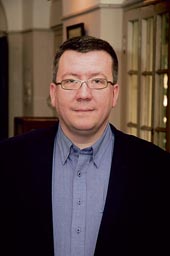 |
 |
| Tim Harper and (below) Christopher Bayly |
Christopher Bayly looks every bit the stern, no-nonsense disciplinarian that one might expect a Cambridge professor of history to be. But Tim Harper doesn’t quite fit that image — he could just as well be an actor specialising in carnivalesque roles, or a concert violinist, or even a chef.
The contrast, it seems, is confined to their appearance. These two historians have been teaching a course on the histories of south and south-east Asia at the University of Cambridge since 1987.
The collaboration has also produced two books, Forgotten Armies: The Fall of British Asia, 1941-45, which came out in 2004, and Forgotten Wars: Freedom and Revolution in Southeast Asia, which will be out in a few weeks’ time.
The authors hurry to clear two common misconceptions about their books.
First, these are social, and not military history. “The titles were the publisher’s idea, military history being the in thing now,” is how Harper explains it.
Second, the two are not volumes I and II of a single work, although “the second takes off from where the first one left”.
Dealing with the history of India and its eastern neighbours during and after World War II, both the books explore the role of Subhas Chandra Bose and his Indian National Army in influencing liberation movements in the region.
This is the overt reason why Bayly and Harper have been invited to deliver the Netaji Oration and Sisir Bose Lecture, respectively, this year.
His studies have been bringing Bayly to India since 1965. For Harper, this is his first visit to Calcutta.
In the land still much-steeped in Netaji lore, it is surprising how little of the hero’s influence outside India is known. “Which is why I thought of choosing as my lecture subject the interactions between Netaji and Aung San of Burma,” says Bayly, who had great problems accessing archival material in the junta-ruled Myanmar (formerly Burma).
Harper was surprised to find the awe and respect Subhas Bose still commanded in the Malay peninsula, where many to this day remember his fiery speeches. It is this Indian “connection” in the revolt in Malaya that Harper chose to talk about in his lecture.
Neither Harper nor Bayly feel exercised, though, over the controversy surrounding Bose’s death or disappearance. “We maintain that he was last seen around Taipei airport in August 1945,” the authors say, almost in unison.
In fact, they prefer to look at the debate as “an interesting historical phenomenon” witnessed in many countries.











